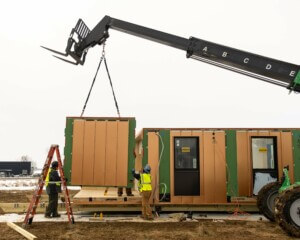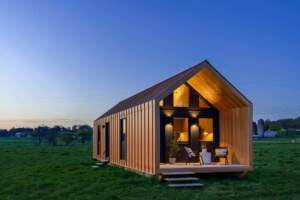On the corner of Washington and Charles streets in Greenwich Village, a modular home has been plopped down in a vacant parking lot. It may seem an unlikely sight—or site for that matter—but what distinguishes this home from most of its tony neighbors is its eye-catching price tag: $35,000.
MEKA Modular Homes founder Michael de Jong came up with the idea of offering inexpensive yet smartly designed units via the Internet, and engaged Jason Halter and Christos Marcopoulous of Toronto-based Studio (n-1) to create them. Another partner, Stephen Do, oversees the manufacturing in Ningbo, China. The units are built utilizing standard shipping containers, and several original features are maintained once horizontal cedar strips are faceted onto the exterior, including industrial doors and a few ship-metal gray accents. Elsewhere, bamboo covers the interior floors, walls, and ceiling. Brushed stainless steel meets tangerine cabinets, and natural light floods the 320-square-foot space through a floor-to-ceiling window that opens onto a collapsible deck.
The homes arrive on site 95 percent complete. It’s possible to configure the units in any number of ways, creating courtyards, cantilevering one on top of another, or expanding them up to 1,920 square feet. As the entire container is utilized, the structure can withstand hurricane-strength winds. The reuse of shipping containers remains part of a long-running trend, but the firm hopes to distinguish itself by streamlining the process, keeping costs down and the design standards high.
“All the owner needs is a screwdriver and a hammer,” Marcopoulous said during a tour of the show unit yesterday, which is open for public perusal through mid-December.
He allowed that an electrician and plumber would be advisable to bring the unit onto the grid, as well as to hook up kitchen appliances, like a stove and refrigerator, which are not included in the price. Solar power and water-retention options are available to those who want to remain off the grid. The entire installation should take no more than five days.
Asked if the low cost could hold makings of Levittown sprawl without the planning, Marcopoulous responded that owners still need local building permits. “I don’t think we’d cause a huge problem in the Midwest. Even if a lot of these were assembled, I think it would make a great neighborhood,” he said.
Interest has been swift, with the first two units sold before yesterday’s opening. A few may even be moving in next door: Marcopoulous said that artist Julian Schnabel is considering hoisting a couple of them atop his nearby palazzo.










